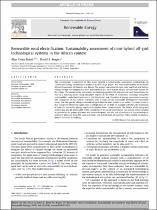 ResearchSpace
ResearchSpace
Renewable rural electrification: sustainability assessment of mini-hybrid off-grid technological systems in the African context
JavaScript is disabled for your browser. Some features of this site may not work without it.
- ResearchSpace
- →
- Research Publications/Outputs
- →
- Journal Articles
- →
- View Item
| dc.contributor.author |
Brent, AC

|
|
| dc.contributor.author |
Rogers, DE

|
|
| dc.date.accessioned | 2009-05-26T13:36:46Z | |
| dc.date.available | 2009-05-26T13:36:46Z | |
| dc.date.issued | 2009-05 | |
| dc.identifier.citation | Brent, AC and Rogers, DE. 2009. Renewable rural electrification: sustainability assessment of mini-hybrid off-grid technological systems in the African context. Renewable Energy (2009). pp 1-9 | en |
| dc.identifier.issn | 0960-1481 | |
| dc.identifier.uri | http://hdl.handle.net/10204/3404 | |
| dc.description | Author Posting. Copyright Elsevier, 2009. This is the author's version of the work. It is posted here by permission of Elsevier for personal use, not for redistribution | en |
| dc.description.abstract | The investigation summarised in this paper applied a sustainability assessment methodology on a renewable energy technological system in a rural village project that was commissioned by the South African Department of Minerals and Energy. The project comprised of wind, solar and lead acid battery energy storage technologies that were implemented as a mini-hybrid off-grid electrification system for the village. The sustainability assessment methodology predicts the outcomes of such interventions by way of a learning model using discipline experts in the fields of economics, sociology, ecosystem sustainability, institutional governance, and the physics and chemistry of energy conversion processes. The comparison of the project’s outcomes with a South African sustainable development framework shows that the specific village renewable off-grid electrification system is not viable. The main reason is that charges for electricity supply costs in village grids are too high for available subsidies; the economies of scale for renewable energy supply technologies favour national grids. The failure of the integrated system may also be attributable to the complexity of the social-institutional sub-system, which resulted in uncertainty for project planners and system designers, and the lack of resilience of the technological system to demands from the socio-economic and institutional sub-systems. Policy-related recommendations are made accordingly | en |
| dc.language.iso | en | en |
| dc.publisher | Elsevier | en |
| dc.subject | Renewable energy | en |
| dc.subject | Sustainability science | en |
| dc.subject | Sustainable development | en |
| dc.subject | Technology management | en |
| dc.subject | Technology assessment | en |
| dc.subject | Technology transfer | en |
| dc.subject | Sustainability indicators | en |
| dc.subject | Mini-hybrid off-grid system | en |
| dc.title | Renewable rural electrification: sustainability assessment of mini-hybrid off-grid technological systems in the African context | en |
| dc.type | Article | en |
| dc.identifier.apacitation | Brent, A., & Rogers, D. (2009). Renewable rural electrification: sustainability assessment of mini-hybrid off-grid technological systems in the African context. http://hdl.handle.net/10204/3404 | en_ZA |
| dc.identifier.chicagocitation | Brent, AC, and DE Rogers "Renewable rural electrification: sustainability assessment of mini-hybrid off-grid technological systems in the African context." (2009) http://hdl.handle.net/10204/3404 | en_ZA |
| dc.identifier.vancouvercitation | Brent A, Rogers D. Renewable rural electrification: sustainability assessment of mini-hybrid off-grid technological systems in the African context. 2009; http://hdl.handle.net/10204/3404. | en_ZA |
| dc.identifier.ris | TY - Article AU - Brent, AC AU - Rogers, DE AB - The investigation summarised in this paper applied a sustainability assessment methodology on a renewable energy technological system in a rural village project that was commissioned by the South African Department of Minerals and Energy. The project comprised of wind, solar and lead acid battery energy storage technologies that were implemented as a mini-hybrid off-grid electrification system for the village. The sustainability assessment methodology predicts the outcomes of such interventions by way of a learning model using discipline experts in the fields of economics, sociology, ecosystem sustainability, institutional governance, and the physics and chemistry of energy conversion processes. The comparison of the project’s outcomes with a South African sustainable development framework shows that the specific village renewable off-grid electrification system is not viable. The main reason is that charges for electricity supply costs in village grids are too high for available subsidies; the economies of scale for renewable energy supply technologies favour national grids. The failure of the integrated system may also be attributable to the complexity of the social-institutional sub-system, which resulted in uncertainty for project planners and system designers, and the lack of resilience of the technological system to demands from the socio-economic and institutional sub-systems. Policy-related recommendations are made accordingly DA - 2009-05 DB - ResearchSpace DP - CSIR KW - Renewable energy KW - Sustainability science KW - Sustainable development KW - Technology management KW - Technology assessment KW - Technology transfer KW - Sustainability indicators KW - Mini-hybrid off-grid system LK - https://researchspace.csir.co.za PY - 2009 SM - 0960-1481 T1 - Renewable rural electrification: sustainability assessment of mini-hybrid off-grid technological systems in the African context TI - Renewable rural electrification: sustainability assessment of mini-hybrid off-grid technological systems in the African context UR - http://hdl.handle.net/10204/3404 ER - | en_ZA |





